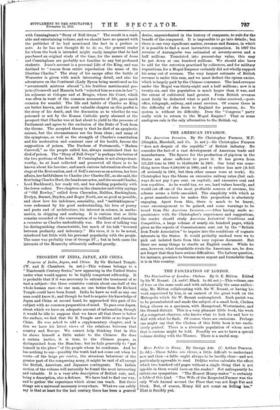PROGRESS OF INDIA, JAPAN, AND CHINA.
Progress of India, Japan, and China. By Sir Richard Temple. (W. and R. Chambers. 5s. net.)—This volume belongs to a " Nineteenth Century Series," now appearing in the United States under what would appear to be highly competent editorship. It is probable that if it was necessary to entrust the treatment of so vast a subject—the three countries contain about one-half of the whole human race—to one man, no one better than Sir Richard Temple could have been found. India he knew as well as any one man could know it ; and though he had to acquire his knowledge of Japan and China at second band, he approached this part of his subject with no common preparation of mind. To pass over Japan, about which we have an adequate amount of information, though it would be idle to suppose that we know all that there is below the surface, we find that Sir R. Temple saw little or no hope for China. He was asked to add a supplementary chapter, and in this we have his latest views of the relations between that country and Europe. We cannot help thinking that in this he shows himself a little unfair to the Chinese. He does a certain justice, it is true, to the Chinese proper, as distinguished from the • Manchus ; but he fails generally to "put himself in.the place " of the people whom he condemns. And ho has nothing to say—possibly the truth had not come out when he wrote—of the large per contra, the atrocious behaviour of the greater part of the conquering army, it might be said of all except the British, American, and Japanese contingents. The Indian section of the volume will naturally be found the most interesting and valuable. It is a very-able description of British rule, and, being a description, also &defence. We have had to find our Way, and to. gather' the -experience which alone' can teach. But these things are a universal necessary everywhere. 'What we can safely say is that at least for the last century there has been a general desire, unprecedented in the history of conquests, to rule for the benefit of the conquered. It is impossible to go into details; but there is one very significant matter, revenue and finance, in which it is possible to find a most instructive comparison. In 1697 the revenue of Aurungzebe was estimated at seventy-seven and a half millions. Translated into present-day value, this may be put down at one hundred millions. We should also have to add for the extortion practised by collectors, and for military requisitions, for a Mogul Emperor certainly did not wholly support his army out of revenue. The very largest estimate of British revenue is under this sum, and we must deduct the opium excise, which is largely paid by the Chinese consumer.. The land-revenue under the Mogul was thirty-eight and a half millions ; now it is twenty-six, and the population is much larger than it was, and the extent of cultivated land greater. From British revenue must fairly be deducted what is paid for value received,—post- office, telegraph, railway, and canal services. Of course there is the difficulty of the drain to England for pensions, &c. No system is without its difficulty. Does the " Congress " party really wish to return to the Mogul Empire ? That or some analogous rule is the only alternative to the British raj.






















































 Previous page
Previous page